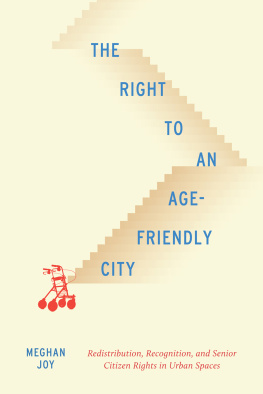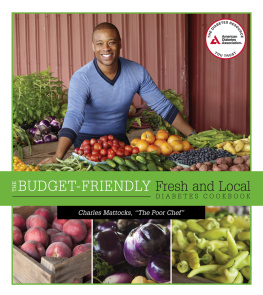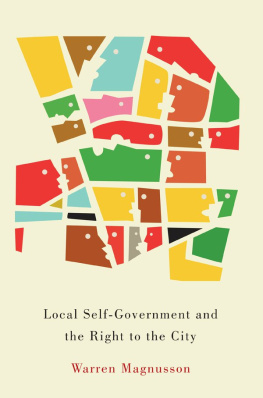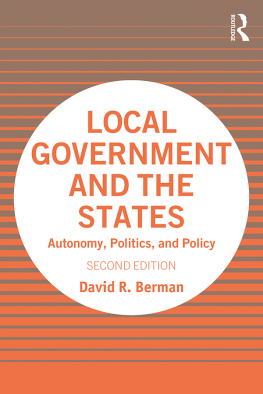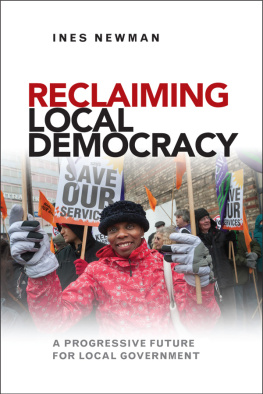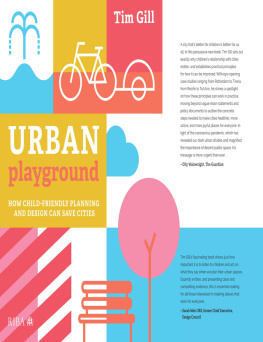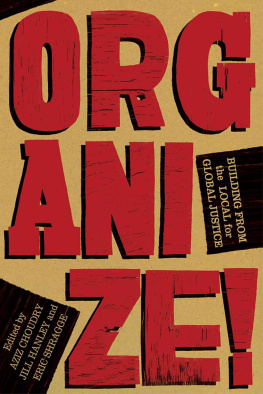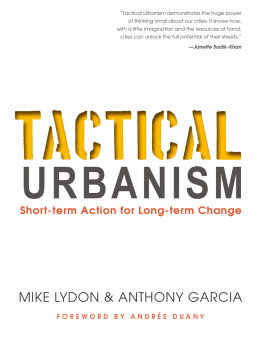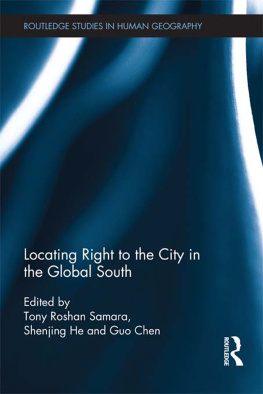
THE RIGHT TO AN AGE-FRIENDLY CITY
MCGILL-QUEENS STUDIES IN URBAN GOVERNANCE
Series editors: Kristin Good and Martin Horak
In recent years there has been an explosion of interest in local politics and the governance of cities both in Canada and around the world. Globally, the city has become a consequential site where instances of social conflict and of cooperation play out. Urban centres are increasingly understood as vital engines of innovation and prosperity and a growing body of interdisciplinary research on urban issues suggests that high-performing cities have become crucial to the success of nations, even in the global era. Yet at the same time, local and regional governments continue to struggle for political recognition and for the policy resources needed to manage cities, to effectively govern, and to achieve sustainable growth.
The purpose of the McGill-Queens Studies in Urban Governance series is to highlight the growing importance of municipal issues, local governance, and the need for policy reform in urban spaces. The series aims to answer the question why do cities matter? while exploring relationships between levels of government and examining the changing dynamics of metropolitan and community development. By taking a four-pronged approach to the study of urban governance, the series encourages debate and discussion of: (1) actors, institutions, and how cities are governed; (2) policy issues and policy reform; (3) the city as case study; and (4) urban politics and policy through a comparative framework.
With a strong focus on governance, policy, and the role of the city, this series welcomes manuscripts from a broad range of disciplines and viewpoints.
1 Local Self-Government and the Right to the City
Warren Magnusson
2 City-Regions in Prospect? Exploring Points between Place and Practice
Edited by Kevin Edson Jones, Alex Lord, and Rob Shields
3 On Their Own Women, Urbanization, and the Right to the City in South Africa
Allison Goebel
4 The Boundary Bargain Growth, Development, and the Future of CityCounty Separation
Zachary Spicer
5 Welcome to Greater Edendale Histories of Environment, Health, and Gender in an African City
Marc Epprecht
6 Still Renovating A History of Canadian Social Housing Policy
Greg Suttor
7 Order and Disorder Urban Governance and the Making of Middle Eastern Cities
Edited by Luna Khirfan
8 Toward Equity and Inclusion in Canadian Cities Lessons from Critical Praxis-Oriented Research
Edited by Fran Klodawsky, Janet Siltanen, and Caroline Andrew
9 Accountability and Responsiveness at the Municipal Level Views from Canada
Edited by Sandra Breux and Jrme Couture
10 A Neighborhood Politics of Last Resort Post-Katrina New Orleans and the Right to the City
Stephen Danley
11 Shaping the Metropolis Institutions and Urbanization in the United States and Canada
Zack Taylor
12 Chinas Urban Future and the Quest for Stability
Edited by Rebecca Clothey and Richardson Dilworth
13 Big Moves Global Agendas, Local Aspirations, and Urban Mobility in Canada
Anthony Perl, Matt Hern, and Jeffrey Kenworthy
14 The Right to an Age-Friendly City Redistribution, Recognition, and Senior Citizen Rights in Urban Spaces
Meghan Joy
THE RIGHT TO AN AGE-FRIENDLY CITY
Redistribution, Recognition, and Senior Citizen Rights in Urban Spaces
MEGHAN JOY
McGill-Queens University Press
Montreal & Kingston London Chicago
McGill-Queens University Press 2020
ISBN 978-0-2280-0394-6 (cloth)
ISBN 978-0-2280-0395-3 (paper)
ISBN 978-0-2280-0467-7 (ePDF)
ISBN 978-0-2280-0468-4 (ePUB)
Legal deposit fourth quarter 2020
Bibliothque nationale du Qubec
Printed in Canada on acid-free paper that is 100% ancient forest free (100% post-consumer recycled), processed chlorine free
This book has been published with the help of an Aid to Research Related Events grant from Concordia University.
We acknowledge the support of the Canada Council for the Arts.
Nous remercions le Conseil des arts du Canada de son soutien.
Library and Archives Canada Cataloguing in Publication
Title: The right to an age-friendly city : redistribution, recognition, and senior citizen rights in urban spaces / Meghan Joy.
Names: Joy, Meghan, 1983- author.
Series: McGill-Queens studies in urban governance ; 14.
Description: Series statement: McGill-Queen's studies in urban governance ; 14 | Includes bibliographical references and index.
Identifiers: Canadiana (print) 20200306456 | Canadiana (ebook) 20200306537 | ISBN 9780228003946 (cloth) | ISBN 9780228003953 (paper) | ISBN 9780228004677 (ePDF) | ISBN 9780228004684 (ePUB)
Subjects: LCSH: City planningSocial aspectsOntarioToronto. | LCSH: Population agingSocial aspectsOntarioToronto. | LCSH: Urban elderlyServices forOntarioToronto. | LCSH: Urban elderlyCivil rightsOntarioToronto. | LCSH: Urban elderlyOntarioTorontoSocial conditions. | LCSH: Urban policyOntarioToronto.
Classification: LCC HT169.C32 T67 2020 | DDC 307.1/216dc23
For Brad. My partner in this and everything else.
CONTENTS
THE RIGHT TO AN AGE-FRIENDLY CITY
INTRODUCTION
What Are Age-Friendly Cities?
My interest in the topic of population aging was ignited personally as I experienced the aging of my loved ones and noticed the behaviours of senior citizens around me. In the space of a few years, my Grandma passed away from ALS and my Nana from dementia. I witnessed the toll that informal caregiving takes on a family, even when some formal supports are present. At the same time, my elderly neighbour was taking care of her ailing husband, whose wish was to die at home. She also cherished the familiarity of aging at home, which we witnessed in the way she continued to prepare her husbands favourite meal of roasted rabbit and carefully plucked the ripened pears from their backyard tree in late summer. Yet, this caregiving role also left our neighbour with feelings of intense sadness and anxiety, which she would often express to me and my partner across the backyard fence. She suffered from arthritis, which affected her mobility, and once we saw her severely bruised from a fall. My partner was called on several occasions to help our neighbour carry her husband to bed and to fetch her arthritis medicine from the pharmacy down the street when her pain was unbearable. She did not drive and though living close to downtown Toronto and a short walk from a grocery store, she struggled to carry bags of food home. This couple had children who lived outside the city and visited only on occasion. On those visits, we heard them begging their parents to consider moving to a long-term care home, but the couple wanted to age in place in their beloved neighbourhood and private residence. One cold and icy winter, after weeks had gone by without seeing our neighbour, we learned from her son that she had passed away after a bad fall. This caused me to reflect on the number of people living in her situation. I began to ask whether there was more that we could have done, collectively as a society, to support this couple.
As I walked around my Toronto neighbourhood, I became more conscious of barriers in the urban environment and the behaviours seniors took to adapt to them. How the old Portuguese men would sit chatting on the often-broken benches at the top of Christie Pits Park but never venture down the steep embankment into the ravine. I found myself increasingly angry having to move large bins from the middle of the sidewalk on garbage day so that neighbours with walkers and wheelchairs would not have to cross the street to get by. One early morning while walking our dog, my partner and I encountered an old lady who had fallen on her step bringing bags of rubbish out to the curb for collection. We helped her up and led her back into the house, wondering who would be there to assist her the next time, as she appeared to live alone in an old Victorian building.
Next page
